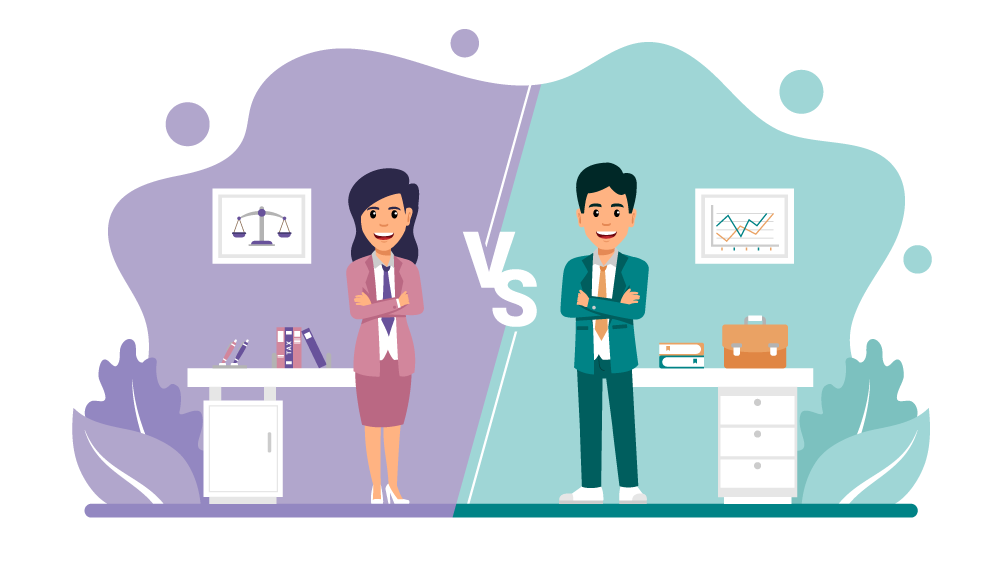When tax season rolls around, it becomes important to understand what a tax attorney and a CPA are. These are two different types of professionals you may need when filing your taxes. Maybe you’re afraid of an IRS audit, even though only about 2.5% of small businesses get audited each year.
In most cases, if you own a business, you will deal with tax debt, not an audit. However, this still means dealing with the IRS on your own. With the right tax attorney or CPA, you might be in better shape.
Figuring out if you need a tax attorney or a CPA starts with understanding what each professional can do for you. Let’s look at what both are and the differences between the two.

What is a Tax Attorney?
TopTaxDefenders.com defines a tax attorney as, “legal professionals with law degrees.” This individual has passed the bar exam and they specialize in the legal issues with tax preparation.
To make it simple, a tax attorney is a lawyer that has decided to specialize in tax law. They can handle all types of legal tax issues, such as halting wage garnishment, undoing clients and levies, and settling back taxes for you.
There are a few different types of tax attorneys for different issues. Some may have experience with trusts and estates, while others work specifically with businesses.
What is a CPA?
A CPA is someone that has earned a five-year business degree with more than 150 hours of education. They have also passed the CPA exam and have gone on to complete 120 hours of continuing education every three years.
CPAs are not found at a regular tax preparation business. They have a higher level of training and often handle more complicated tax situations. While CPAs prepare taxes, they commonly do it for businesses, those with a high net worth, or those with more complicated situations.
CPAs will be trained in more than just the accounting and business courses they took in college. They will have to pass the four-part CPA exam, which includes:
- Audit and attestation
- Regulation
- Financial accounting and reporting
- Business environment and concepts
This exam is not easy to pass. CPAs also have to work 1,800 hours under a licensed CPA before they can gain this certification. The number of hours they have to work may vary from one state to another.
Tax Attorney vs CPA: The Key Differences
The key differences between a tax attorney and a CPA are pretty easy to spot. When you look at what they can do for you, it’s pretty easy to see the differences.
What Does a CPA Handle?
When you hire a CPA, you will hire them to handle the following:
- File your taxes
- Find all possible deductions and credits for you
- Handle bookkeeping
- Prepare financial documents
- Take care of your payroll management
- Help with budgeting and financial planning advice
- Keep up-to-date on any tax law changes
- Help with acquiring, merging, or selling your business
- Take out a small business loan for you
- Help you figure out the best business structure
- Assist during an IRS audit
- Decide between accrual or cash accounting methods
- Monitor your finances
A CPA can negotiate on your behalf with the IRS, as well. They can represent a taxpayer and they have some special qualifications to help with tax controversies and litigations with the U.S. Tax Court.
What Does a Tax Attorney Handle?
When you hire a tax attorney, they are not going to help you keep track of your finances or file your taxes. However, they do provide specific services you may need including:
- Help with a trust or estate
- Help you deal with back taxes
- Assist when you’re facing any liens or levies due to unpaid taxes
- Can get wage garnishments stopped
- Will negotiate on your behalf with the IRS
If you need legal advice or representation in court, it’s time to hire a tax attorney.
Choosing to Become a Tax Attorney or CPA
Maybe you’re not looking for a tax attorney or CPA to represent you. Maybe you’re considering these two potential careers. If this is the case, it’s important to understand the differences.
Education and Training
If you want to become a CPA, you’ll have to complete 150 hours of education. You will need to earn a bachelor’s degree and complete an additional 30 hours of graduate courses. Many CPAs complete their master’s degrees.
Once you have the right education, you will still need to complete the necessary work experience and pass the CPA exam. Continuing education will also be necessary.
Of course, if you want to become a tax attorney, you will need to complete law school. Throughout law school, you will likely want to choose a specialty in finance or tax law. Becoming a tax attorney will mean more time in school than becoming a CPA.
There is also such a thing as an Attorney-CPA. This is someone that has become a CPA and has also completed their law degree and passed the bar exam. This type of person can be very valuable to a company.
Salary
While the education and training are different between a tax attorney and a CPA, the salary is also different. A Tax Attorney has a median salary of about $102K per year. The range runs from $62K to $118K per year, according to salary.com.
If you become a CPA, you have the ability to make quite a bit more than a tax attorney. The median salary is about $265K. The range for a CPA will go from about $70K to $461K.
Whether you’re trying to decide to hire a tax attorney or a CPA, or you’re trying to decide on a career, understanding both is important. These two professionals may both work with taxes and the IRS, but they are not the same. Hiring a CPA is rather common for businesses. However, they may not need a tax attorney very often, or at all.
Make sure you understand the differences between a tax attorney and a CPA. With a good understanding of both, you can make the right hiring decision or the right career decision for you.





